Finding Empowerment in Choice, Asking for Help, and the Journey to Build a Family
I shared my big news with friends while visiting them out of town over Mother’s Day weekend. I planned to begin in vitro fertilization with a donor to freeze embryos later that year.
The couple, a fellow Navy veteran and their spouse, had experience in finding a sperm donor.
“Be prepared for the weirdest online shopping of your life,” my friend said with a laugh.
At 36, after the end of my third long-term relationship in six years, I admitted to myself that the chance of finding a life partner during my reproductive years was waning. I’d done the math. Even if I met someone the day after I made my decision, the earliest I could start trying for a child was 38 when factoring in a whole courtship and marriage.
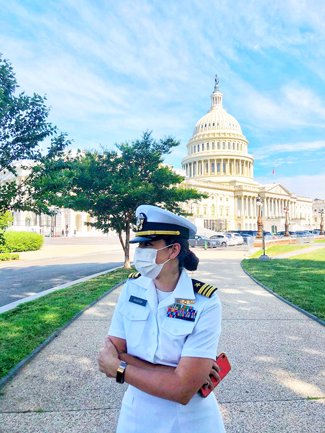
At 36, and at the end of her third long-term relationship in six years, Andrea Goldstein decided to undergo IVF. Photo courtesy of the author.
Besides, I had little interest in trying to keep dating. I also knew I wanted to become a parent on my own if I was still single at 40. While IVF and egg freezing are no guarantee of a baby, I decided it was best to increase the odds as early as possible.
As it turned out, “online shopping” for a donor was one of the easiest parts of the process. I spent as little time as possible on a website that allows you to sort through an overwhelming number of qualities.
I knew I wanted a donor of Jewish descent with brown hair and brown eyes to increase the likelihood my child would look like me. Since brown eyes and curly brown hair are common among Ashkenazi Jews, finding a donor was not particularly difficult. Although I could learn details as seemingly small as the donor’s favorite bird, I wanted to know as little as possible.
IVF can feel like The Hunger Games, a constant elimination process to get to a single, live birth. During an IVF cycle, every woman will have a certain number of follicles that appear on ultrasound. Of those follicles, fewer will produce eggs. Of those eggs, not all of them will be mature. Of those eggs, not all of them will fertilize, and those that fertilize will not all develop or be genetically normal.
Of the 18 eggs I froze during two previous cycles in my early 30s, I had no idea how many would even survive unfreezing, let alone fertilize and then be genetically normal. IVF would give me a better idea of that possibility.
Egg freezing and IVF are exorbitantly expensive—almost identical to the two years of VA disability back pay I recouped around the time I was undergoing the procedures. Insurance doesn’t usually cover egg freezing and IVF, especially for single women and same-sex couples.
The Department of Veterans Affairs covered some of my costs, including labs, office visits, and all medications—reducing my expenses by about 30% and saving me thousands of dollars. And I was thankful for that.
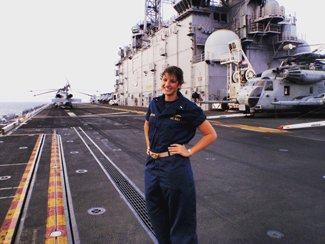
Andrea Goldstein spent much of her active duty naval career at sea and overseas. Photo courtesy of the author.
But around every turn, I also felt I was being punished for being single. While VA has long covered the costs of IVF for veterans with “service-connected” injuries and health conditions, it was only for legally married, same-sex couples. So even though I fell under the “service-connected” requirement, the procedure wasn’t fully covered. VA, thankfully, recently changed its policy: Single people and all couples, including those using donor gametes, will now be covered. The service connection requirement still applies, but the change is a huge step forward to enable veterans to build their families.
As I began IVF, I felt grateful and empowered. But mostly I felt angry. I was furious at the men who had run down the clock of my reproductive years moving the goalposts instead of committing or letting me go. I was angry at myself for not walking away from these relationships sooner.
Award-Winning Journalism in Your Inbox
I was angry that I gave the best of my reproductive years to the military through back-to-back deployments. I was angry that I had to establish service connection for infertility care rather than having it treated like any other health condition.
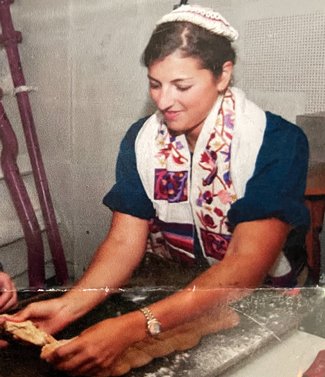
Andrea Goldstein wanted to find a donor of Jewish descent with brown hair and brown eyes to increase the likelihood that her child would look like her. Photo courtesy of the author.
I was angry that IVF was going to subject me to a painful, invasive, and expensive medical procedure that would have been covered had I been married to a man, because VA policy at the time denied coverage to single people, same-sex couples, and anyone who would require a donor to conceive.
I was angry that we do not talk about how devastating infertility treatment can be on the body, because women are expected to just suck it up when it comes to pain, and most of the stories we hear about IVF are about successful pregnancies from happy couples. The hormones I took caused migraines and nausea so severe I ended up not going into the office for a month and taking more than a week off of work.
I felt unloved and unchosen, like something was wrong with me, even though I knew intellectually that wasn’t true. The physical, emotional, and financial costs added insult to injury.
During this time, I also began significantly self-isolating, devastated by the Oct. 7, 2023, terrorist attacks on Israel. I watched as people I’d called friends for years chose antisemitic slogans and performative social media activism over genuine connection. People and spaces I once thought safe no longer were.
But hemorrhaging false friends tightened my circle. And as my egg retrieval date neared, my anger began to wane, replaced by the warmth of gratitude.
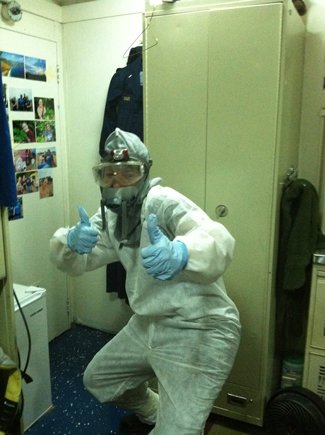
As she began IVF, Andrea Goldstein felt grateful. But she was also angry, she writes, for giving the best of her reproductive years to the military. Photo courtesy of the author.
I was grateful for the constantly improving science, for access to health care, for the ability to afford this process. I was grateful that continuing to build a Jewish family, somewhere in the future, felt like an existential victory.
I was grateful that I knew the challenges ahead and decided to ask for help, even though asking for help is hard. My mom flew down from New York. My friends signed up to bring meals and walk my dog. I knew I would have done the same for them. And I have.
When my egg retrieval date arrived earlier than originally scheduled, a friend and fellow veteran got up before dawn to take me to my appointment. She sat patiently in the waiting room reading Iron Flame during my procedure and took me for bagels afterward.
Three times a day for a week, friends stopped by to deliver food or walk my dog or just check on me. Friends from across the country in Chicago and San Francisco sent me food delivery gift cards. My stepbrother had a bagel platter delivered to my front door. Friends from across the Atlantic in England and Switzerland sent me flowers. Friends organized movie livestreams and joined in from six different time zones.
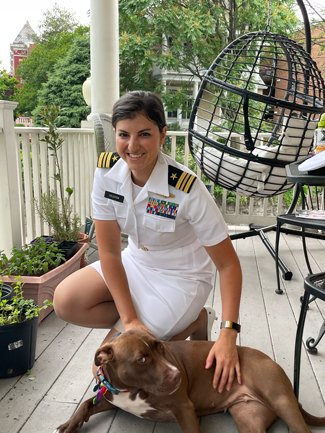
While IVF and egg freezing did not guarantee a baby, Andrea Goldstein decided to increase the odds as early as possible. Photo courtesy of the author.
In the days after the procedure, when I was in the most foul mood as my hormones began to adjust back to normal, my mom spent a few days visiting, keeping me company for a few hours, and giving me space when I just wanted to be alone with my dog.
And around this time I began to feel relief, the great weight of my own and perceived societal expectations lifted. In the weeks after my procedure, I learned that four of my embryos were considered “grade A” genetically normal—enough to feel confident that the statistics were in my favor and the rest would all be luck.
I also no longer felt “unpicked,” waiting on the sidelines for a man to decide that I was worth marrying. My friends and family surrounded me with love and support. My friends had chosen me. I had chosen me.
Award-Winning Journalism in Your Inbox
This was the world that any future child I may have will be part of. They will be surrounded by family and friends who adore them and their mother, who show them how wanted and special they are.
Today, I feel completely emancipated from a set timeline of meeting a partner, able to focus only on what brings me joy. I feel healthier in my approach to all of my relationships. I value the life I actually have, as unconventional as it may be.
This War Horse reflection was written by Andrea Goldstein, edited by Kristin Davis, fact-checked by Jess Rohan, and copy-edited by Mitchell Hansen-Dewar. Abbie Bennett wrote the headlines.



Comments are closed.